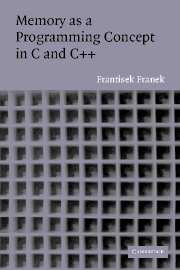Book contents
- Frontmatter
- Contents
- Acknowledgments
- Dedication
- 1 Introduction
- 2 From Source File to Executable File
- 3 Variables and Objects; Pointers and Addresses
- 4 Dynamic Allocation and Deallocation of Memory
- 5 Functions and Function Calls
- 6 One-Dimensional Arrays and Strings
- 7 Multi-Dimensional Arrays
- 8 Classes and Objects
- 9 Linked Data Structures
- 10 Memory Leaks and Their Debugging
- 11 Programs in Execution: Processes and Threads
- A Hanoi Towers Puzzle
- B Tracing Objects in C++
- C Tracing Objects and Memory in C++
- D Thread-Safe and Process - Safe Reporting and Logging Functions
- Glossary
- Index
1 - Introduction
Published online by Cambridge University Press: 13 January 2010
- Frontmatter
- Contents
- Acknowledgments
- Dedication
- 1 Introduction
- 2 From Source File to Executable File
- 3 Variables and Objects; Pointers and Addresses
- 4 Dynamic Allocation and Deallocation of Memory
- 5 Functions and Function Calls
- 6 One-Dimensional Arrays and Strings
- 7 Multi-Dimensional Arrays
- 8 Classes and Objects
- 9 Linked Data Structures
- 10 Memory Leaks and Their Debugging
- 11 Programs in Execution: Processes and Threads
- A Hanoi Towers Puzzle
- B Tracing Objects in C++
- C Tracing Objects and Memory in C++
- D Thread-Safe and Process - Safe Reporting and Logging Functions
- Glossary
- Index
Summary
The motivation for this book came from years of observing computer science students at universities as well as professional programmers working in software development. I had come to the conclusion that there seemed to be a gap in their understanding of programming. They usually understood the syntax of the programming language they were using and had a reasonable grasp of such topics as algorithms and data structures. However, a program is not executed in a vacuum; it is executed in computer memory. This simple fact exerts a powerful influence on the actual behavior of the program - or, expressed more precisely, a subtle yet powerful influence on the semantics of the particular programming language. I had observed that many students and programmers did not fully understand how memory affected the behavior of the C and C++ programs they were designing. This book is an attempt to fill this gap and provide students and programmers alike with a text that is focused on this topic.
In a typical computer science curriculum, it is expected that students take courses in computer architecture, operating systems, compilers, and principles of programming languages - courses that should provide them with a “model” of how memory matters in the behavior of programs.
However, not all students end up taking all these courses, and even if they do, they may not take them in the right order. Often the courses are presented in a disjointed way, making it difficult for students to forge a unified view of how memory affects the execution of programs.
- Type
- Chapter
- Information
- Memory as a Programming Concept in C and C++ , pp. 1 - 6Publisher: Cambridge University PressPrint publication year: 2003



